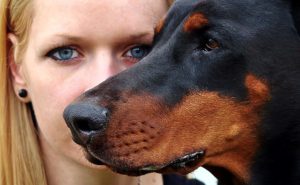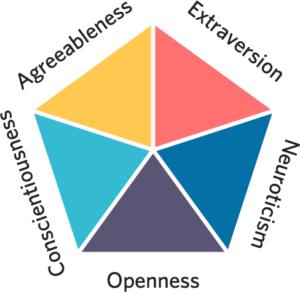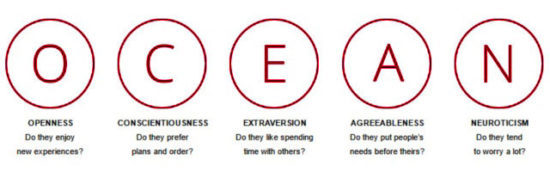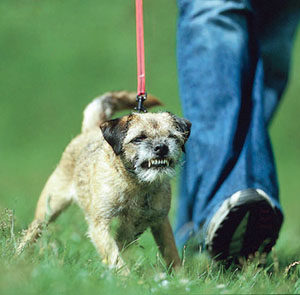Your Personality – how it affects your dog

It is not often realised by the owner of a troublesome dog that they may be somewhat to blame for unwanted behaviours exhibited by their pet. Your personality; how it affects your dog, is profound. Of course, many behaviours can be the result of not socialising a puppy, especially during the formative period of the dog’s young life, ie. 3-16 weeks.
Is it in their DNA?
There are many reasons for dogs’ behaviours and traits and we must accept that some of the things dogs do are in their DNA. In other words, they are instinctual and the dog cannot readily control the urges or stimuli that encourages that behaviour.
You must look at your own character
But as far as our input into our dog’s actions, we can do our best to exhibit a calm and assertive state of mind. To do that, we really need to know our own character and admit and control our negative traits and moods. We can also take advantage of our positive characteristics.

A personality test
I did a personality test which is recommended by dog behaviourists. It is not difficult, just a few questions will give you an idea of your main characteristics. This can then lead you towards changing your state of mind and seeing just how much it changes your dog’s unwanted behaviours.
Five main characteristics are covered in this test, but you have to be really honest when you answer the questions, which aren’t complicated, just questions on how you see yourself. For example, one of the questions is – do you see yourself as the life and soul of a party, and to what degree. You have a score of 1 – 7 to choose your answer. 1 being you strongly disagree up to 7 when you strongly agree, with 4 being you neither agree or disagree. I’m sure you get the picture.
There are 10 questions and how you answer them gives you an idea of your personality traits. This is very useful when deciding on what breed of dog and it’s activity level, may be best suited to you. You will also be aware of how you must curb your emotions or increase your enthusiasm etc.. when dealing with or training your dog.
The 5 catagories of character are:
- Openness – A high score indicates an imaginative and metaphysical person and a low score, practical and down-to-earth
- Conscientiousness – A high score is a sign of a disciplined person with a low score denoting spontaneity.
- Extroversion – denotes an outgoing and enthusiastic person and a low score indicates a stoical and quiet natured individual.
- Agreeableness – looks at the caring side of a person so a high score means you are altruistic and empathic. Low scorers have a tendency to be more aggressive and are not always very co-operative.
- Neuroticism – A high scorer would be inclined to stress out easily and be more tense, whereas a low scorer will be calm, relaxed and unflappable.

The results are amazingly accurate
As you can see, there will be many variables in the characters of different people. We all have a mixture of these traits. It is a real eye-opener when you realise that the results are somewhat true to your own nature. It certainly makes you look inside yourself and gives you a clue as to how you can control your emotions and characteristics, to improve as a person as well as a dog owner.
How your dog reacts to your emotions
Here’s a little game to play with your dog, just to prove how reactive he is to your emotions:
- Bring your dog to you and get on the floor with him and enthusiastically start to play with his favourite toy or a game that he enjoys.
- Get him really excited for a few minutes or so.
- Then suddenly stop, stand up and walk away or go and sit down.
- Be completely calm and ignore your dog by either checking your phone or doing something else that doesn’t involve him.
Notice what happens when you suddenly stop playing. Does he carry on playing and being excited, or does he mirror your mood and calm down, even lying down next to you. I would be surprised if it were not the latter.

Aggressive on the walk?
Your dog is an expert at deciphering your mood and he will likely copy you. If you’re excited, he’ll get excited. Do you tense up and tighten the lead when a perceived threat comes along on your walk? If so, he will pick up on your anxiety. Many reactive dogs will then go into protective mode. Your body language has told the dog you’re worried, so he also gets worried. He pulls towards the perceived threat, often barking and growling. You pull him back… and so it goes on until you struggle past. You will then calm down and he calms down too!

Very interesting article you wrote here!
I am more of a cat person and know how to calm them and make them like me.
However, I was under the impression that all dogs were excitable especially Jack Russels! I really prefer calm animals and can spend many hours on my own doing my work at home or watching Youtube video.
Dogs, from what I read here, mirror your mood…I am more wise as to dogs’ behaviourisms now!
Thanks for sharing!
Hi Stella, dogs are really adept at knowing how you feel. They are constantly watching our behaviour and they learn from it. For example, knowing when they will be going for a walk. They know right back to when the owner gets up off their chair and goes to get his car keys or does something else that is repeated before a walk commences. I think they know when they are going for a walk before the owner does!
Our own personality definitely affects how our dogs behave, and I have a great example of this… when one of our dogs was a puppy and we’d go on walks my wife and I would RUN not WALK across a street, and to this day he will still run across the street rather than go slow.
I will say I’ve never tried the idea that start playing with them and get them excited then just stop. That’s a really neat idea! Will a dog still learn this even if they’re a few years old now?
Hi Josh, yes an older dog can learn new tricks. Anyway, just try it and see what happens. Your dogs copying you running across the road is typical of conditioning. Our dogs do the same when we bring out the lap trays for our dinner. They both instantly go to their beds. We have never taught them this behaviour. They have been conditioned by their amazing quality of observation.